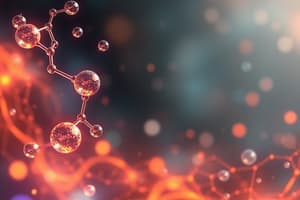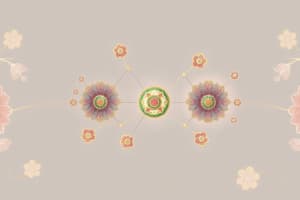Podcast
Questions and Answers
Name one of the learning outcomes of Lecture 1: Functional Groups and Bonds in Chemistry.
Name one of the learning outcomes of Lecture 1: Functional Groups and Bonds in Chemistry.
Identify and describe the types of noncovalent, reversible interactions and their importance.
What are the similar structural components of all cells?
What are the similar structural components of all cells?
genetic material in the form of chromosomes, a membrane bound lipid bilayer
What is the role of water in biochemical interactions?
What is the role of water in biochemical interactions?
Water affects biochemical interactions.
Define pH.
Define pH.
How may changes in pH affect biochemical systems?
How may changes in pH affect biochemical systems?
Flashcards
What are noncovalent interactions?
What are noncovalent interactions?
These bonds are used to form many important structures within the cell and are easily broken and reformed.
What are the common structures found in all cells?
What are the common structures found in all cells?
These include genetic material (DNA) packaged into chromosomes and the membrane that surrounds the cell.
How does water play a role in biochemistry?
How does water play a role in biochemistry?
Water can be found in large amounts in the cell and affects how molecules interact with each other. This is important because most biochemical reactions occur in a watery environment.
What is pH?
What is pH?
Signup and view all the flashcards
How can changes in pH affect biochemical systems?
How can changes in pH affect biochemical systems?
Signup and view all the flashcards
Study Notes
Lecture 1: Functional Groups and Bonds in Chemistry
- One of the learning outcomes is to understand the concept of functional groups and their importance in biochemical reactions.
Structural Components of Cells
- All cells have similar structural components, including carbohydrates, proteins, lipids, and nucleic acids.
Role of Water in Biochemical Interactions
- Water plays a crucial role in biochemical interactions, serving as a solvent, reactant, and coolant, and facilitating chemical reactions within cells.
pH Definition and Effects
- pH is a measure of the concentration of hydrogen ions in a solution, with a pH of 7 being neutral, below 7 being acidic, and above 7 being basic.
- Changes in pH can affect biochemical systems, including: • Altering enzyme activity and protein function • Disrupting cell membrane structure and permeability • Impacting DNA structure and gene expression
Studying That Suits You
Use AI to generate personalized quizzes and flashcards to suit your learning preferences.




